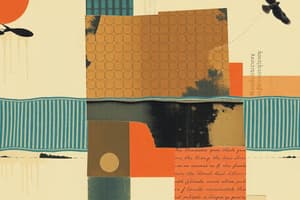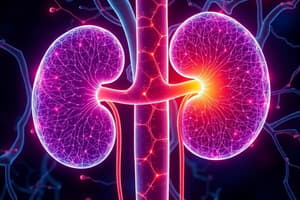Podcast
Questions and Answers
Which is the correct sequence of blood movement through the human heart?
Which is the correct sequence of blood movement through the human heart?
- Vena cavae → right atrium → right ventricle → pulmonary artery → pulmonary vein → left atrium → left ventricle → aorta (correct)
- Vena cavae → left atrium → left ventricle → pulmonary artery → pulmonary vein → right atrium → right ventricle → aorta
- Vena cavae → right atrium → right ventricle → pulmonary vein → pulmonary artery → left atrium → left ventricle → aorta
- Aorta → left atrium → left ventricle → pulmonary artery → pulmonary vein → right atrium → right ventricle → vena cavae
Which area(s) contain oxygenated blood?
Which area(s) contain oxygenated blood?
- I, II, and III
- IV and V (correct)
- III only
- IV only
Which area refers to the pulmonary artery?
Which area refers to the pulmonary artery?
- III (correct)
- II
- V
- IV
How many labeled areas refer to arteries?
How many labeled areas refer to arteries?
What is the order of blood flow?
What is the order of blood flow?
Which statement regarding cardiac output is true?
Which statement regarding cardiac output is true?
Which region represents the isovolumetric contraction portion of the heart cycle?
Which region represents the isovolumetric contraction portion of the heart cycle?
Which region represents the ventricular filling portion of the heart cycle?
Which region represents the ventricular filling portion of the heart cycle?
The myocardium of tunas is
The myocardium of tunas is
Most crustaceans have ______ hearts.
Most crustaceans have ______ hearts.
The ______ prevents the initial depolarization at the S-A node from spreading across the heart from the atria through the ventricles and ending at the tip of the septum.
The ______ prevents the initial depolarization at the S-A node from spreading across the heart from the atria through the ventricles and ending at the tip of the septum.
The pacemaker of a lobster heart is composed of
The pacemaker of a lobster heart is composed of
The P wave of the EKG is produced by the
The P wave of the EKG is produced by the
Which statement describes the Frank-Starling mechanism?
Which statement describes the Frank-Starling mechanism?
The mean pressure in the systemic aorta in a healthy human is about ______ mm Hg.
The mean pressure in the systemic aorta in a healthy human is about ______ mm Hg.
A tall human with normal blood pressure standing upright would be expected to have a pressure of about ______ mm Hg in the leg artery, measured 130 cm below the heart.
A tall human with normal blood pressure standing upright would be expected to have a pressure of about ______ mm Hg in the leg artery, measured 130 cm below the heart.
According to the Poiseuille equation, which of the following does not directly affect flow rate?
According to the Poiseuille equation, which of the following does not directly affect flow rate?
Halving the radius of a vessel ______ the resistance to flow through the vessel by a factor of ______.
Halving the radius of a vessel ______ the resistance to flow through the vessel by a factor of ______.
The most important factor modifying flow in blood vessels is the
The most important factor modifying flow in blood vessels is the
The reason why blood capillaries can be exceedingly thin-walled and yet resist substantial pressures can be explained by
The reason why blood capillaries can be exceedingly thin-walled and yet resist substantial pressures can be explained by
Which statement regarding microcirculatory beds is true?
Which statement regarding microcirculatory beds is true?
Which vertical section denotes the vascular portion with the highest pressure?
Which vertical section denotes the vascular portion with the highest pressure?
Which vertical section denotes the vascular portion with the lowest mean blood velocity?
Which vertical section denotes the vascular portion with the lowest mean blood velocity?
Which vertical section denotes the vascular portion with the highest vascular resistance?
Which vertical section denotes the vascular portion with the highest vascular resistance?
In section I, fluid is ______ the capillary due to ______.
In section I, fluid is ______ the capillary due to ______.
The figure depicts the ______ hypothesis: the initial loss and then regaining of fluid in the capillaries that results, overall, in a net ______ of fluid.
The figure depicts the ______ hypothesis: the initial loss and then regaining of fluid in the capillaries that results, overall, in a net ______ of fluid.
The main difference between the pulmonary circuit and the systemic circuit is that the pulmonary circuit
The main difference between the pulmonary circuit and the systemic circuit is that the pulmonary circuit
Which of the following best describes the contractile properties of the heart of the elasmobranch fish?
Which of the following best describes the contractile properties of the heart of the elasmobranch fish?
Which characteristic is typical of teleost cardiovascular systems?
Which characteristic is typical of teleost cardiovascular systems?
From where do vessels branch off to supply the head and gut with oxygenated blood?
From where do vessels branch off to supply the head and gut with oxygenated blood?
When an air-breathing organ at the mouth is integrated into the circulation depicted in the figure, a new circulation loop is created connecting
When an air-breathing organ at the mouth is integrated into the circulation depicted in the figure, a new circulation loop is created connecting
In fish that have an air-breathing organ (ABO), the blood
In fish that have an air-breathing organ (ABO), the blood
Which statement describes a characteristic not found in the African lungfish Protopterus?
Which statement describes a characteristic not found in the African lungfish Protopterus?
Which plan represents the mammalian circulatory system?
Which plan represents the mammalian circulatory system?
Of the six circulatory plans above, how many partially or completely separate
oxygenated and deoxygenated blood in the heart?
Of the six circulatory plans above, how many partially or completely separate oxygenated and deoxygenated blood in the heart?
Which circulatory plan allows the animals to modulate blood flow to the lungs
independently of blood flow to the rest of the body?
Which circulatory plan allows the animals to modulate blood flow to the lungs independently of blood flow to the rest of the body?
Which animal does not modulate blood flow to the lungs independently of blood flow
to the rest of the body?
Which animal does not modulate blood flow to the lungs independently of blood flow to the rest of the body?
Which structure aids crocodilians in diverting blood flow during diving?
a. Foramen ovale
Which structure aids crocodilians in diverting blood flow during diving? a. Foramen ovale
The _______ circulatory system of squids and octopuses consist of two _______.
The _______ circulatory system of squids and octopuses consist of two _______.
This circulatory plan belongs to which group of animals?
This circulatory plan belongs to which group of animals?
The most oxygenated blood would be found just exiting the structure(s) at
The most oxygenated blood would be found just exiting the structure(s) at
According to the diagram, the highest blood pressure would be found just exiting the
structure(s) at
According to the diagram, the highest blood pressure would be found just exiting the structure(s) at
A squid meets the increased demand for O2 at the tissues during intense exercise by
A squid meets the increased demand for O2 at the tissues during intense exercise by
If a squid and a fish both double cardiac output during exercise, circulatory oxygen
delivery to the tissues in _______ will _______.
If a squid and a fish both double cardiac output during exercise, circulatory oxygen delivery to the tissues in _______ will _______.
Small spaces among cells of nonvascular organs and tissues are called
Small spaces among cells of nonvascular organs and tissues are called
Which statement regarding the lobster circulatory system is false?
Which statement regarding the lobster circulatory system is false?
This circulatory plan belongs to which group of animals?
This circulatory plan belongs to which group of animals?
The most oxygenated blood would be found
The most oxygenated blood would be found
In the human heart, oxygenated blood is carried from the lungs to the heart by the
In the human heart, oxygenated blood is carried from the lungs to the heart by the
The wavy boundaries at I and III represent the
The wavy boundaries at I and III represent the
The blood circulation of crustaceans is _______ than that of fish primarily because of _______.
The blood circulation of crustaceans is _______ than that of fish primarily because of _______.
Cardiac output is directly proportional to
Cardiac output is directly proportional to
The hearts of vertebrates are myogenic, meaning that
The hearts of vertebrates are myogenic, meaning that
The QRS complex arises from ventricular
The QRS complex arises from ventricular
Mean blood pressure in the brain of a standing person is _______ the blood pressure at the heart.
Mean blood pressure in the brain of a standing person is _______ the blood pressure at the heart.
Which property has the greatest effect on the flow of liquid through a tube?
Which property has the greatest effect on the flow of liquid through a tube?
Flow rate equals the difference in blood pressure between the entry of the vascular
system and the exit vessels, divided by
Flow rate equals the difference in blood pressure between the entry of the vascular system and the exit vessels, divided by
Which statement comparing the circulatory systems in mammals and birds is true?
Which statement comparing the circulatory systems in mammals and birds is true?
In which vessel(s) is there a lack of pressure pulse?
In which vessel(s) is there a lack of pressure pulse?
Flashcards
Blood flow through the heart
Blood flow through the heart
Blood enters the heart through the vena cavae, flowing into the right atrium, then to the right ventricle, to the pulmonary artery, the lungs, pulmonary vein, left atrium, left ventricle, and finally into the aorta.
Oxygenated blood location
Oxygenated blood location
Oxygenated blood is found in the pulmonary vein and left side of the heart (left atrium and left ventricle).
Cardiac output
Cardiac output
The amount of blood pumped by the heart per minute, calculated as the product of heart rate and stroke volume.
Frank-Starling mechanism
Frank-Starling mechanism
Signup and view all the flashcards
Blood vessel radius and resistance
Blood vessel radius and resistance
Signup and view all the flashcards
Blood flow - most important factor
Blood flow - most important factor
Signup and view all the flashcards
Microcirculatory beds, vasoconstriction and vasodilation
Microcirculatory beds, vasoconstriction and vasodilation
Signup and view all the flashcards
Capillary fluid movement
Capillary fluid movement
Signup and view all the flashcards
Pulmonary vs. systemic circuit
Pulmonary vs. systemic circuit
Signup and view all the flashcards
Fish heart chambers
Fish heart chambers
Signup and view all the flashcards
Study Notes
Blood Flow Through the Heart
- The correct sequence of blood movement through the human heart is: vena cavae → right atrium → right ventricle → pulmonary artery → pulmonary vein → left atrium → left ventricle → aorta.
Oxygenated Blood Areas
- Areas containing oxygenated blood are IV and V.
Pulmonary Artery Location
- Area III refers to the pulmonary artery.
Number of Arteries
- Four labeled areas refer to arteries.
Blood Flow Order
- The order of blood flow is I → III → IV → V → II.
Cardiac Output
- Cardiac output is the product of heart rate and stroke volume.
Isovolumetric Contraction
- Region I represents the isovolumetric contraction portion of the heart cycle.
Ventricular Filling
- Region V represents the ventricular filling portion of the heart cycle.
Tuna Myocardium
- Tuna myocardium is composed of an outer compact layer with coronary vessels and an inner spongy layer.
Crustacean Heart Type
- Most crustaceans have neurogenic hearts.
S-A Node Prevention
- The connective tissue between the atria and ventricles prevents the initial depolarization of the S-A node from spreading from the atria to the ventricles.
Lobster Heart Pacemaker
- The pacemaker of a lobster heart is specialized myocardium that functions similarly to the S-A node.
EKG P Wave
- The P wave of an EKG is produced by the depolarization of the atria.
Frank-Starling Mechanism
- The Frank-Starling mechanism describes how stretching of cardiac muscle increases the force of contraction.
Mean Systemic Aorta Pressure
- The mean pressure in the systemic aorta of a healthy human is about 95 mm Hg.
Leg Artery Pressure
- A tall human with normal blood pressure standing upright would be expected to have a pressure in the leg artery, 130 cm below the heart, of about 195 mm Hg.
Poiseuille Equation
- The temperature of the tube does not affect the flow rate directly, according to Poiseuille's equation. Other factors are viscosity, radius, and pressure.
Vessel Radius and Resistance
- Halving the radius of a vessel increases resistance to flow by a factor of 16.
Factors Modifying Blood Flow
- The most important factor modifying blood flow in blood vessels is the diameter of the vessel.
Capillary Wall Thinness
- Laplace's law explains why blood capillaries can be exceedingly thin-walled and resist substantial pressures.
Microcirculatory Beds
- Smooth muscles in the walls of arterioles are responsible for vasoconstriction and vasodilation, and anastomoses are one possible path from an arteriole to a venule.
Highest Pressure Blood Vessel
- Section I denotes the vascular portion with the highest pressure.
Lowest Velocity Blood Vessel
- Section III denotes the vascular portion with the lowest mean blood velocity.
Highest Vascular Resistance Blood Vessel
- Section III denotes the vascular portion with the highest vascular resistance.
Fluid Movement in Capillaries
- In section I, fluid moves into capillaries due to colloid osmotic pressure.
Pulmonary vs. Systemic Circuits
- The main difference between the pulmonary and systemic circuits is that the pulmonary circuit produces lower pressures and flows.
Elasmobranch Fish Heart
- Elasmobranch fish hearts have four chambers where all four chambers contract.
Teleost Cardiovascular Systems
- Teleost cardiovascular systems have a heart that receives oxygenated blood flowing from the gills. The cardiac outputs are also lower compared to similar-sized mammals.
Head and Gut Oxygenated Blood Vessels
- Vessels branch off from section II to supply the head and gut with oxygenated blood.
Air-Breathing Organ Integration
- Integrating an air-breathing organ into the fish circulation creates a new circulation loop, connecting sections I and IV.
ABO Blood Mixing
- In fish with air-breathing organs (ABO), blood leaving the ABO mixes with systemic and venous blood.
African Lungfish Characteristics
- The ventral aorta in African lungfish (Protopterus) is an extremely long and branched structure. The atrium and ventricles are partially divided, the conus arteriosus has longitudinal ridges, and the four pairs of branchial arteries arise immediately from the conus arteriosus.
Studying That Suits You
Use AI to generate personalized quizzes and flashcards to suit your learning preferences.





